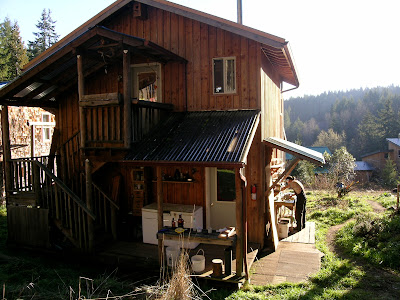
The recent documentary titled
FLOW: For Love Of Water, asks an important question for humanity in the 21st century; Who owns water?
Water flows through earth; from river to tap to sewage treatment plant and back to river. It is a constant volume that changes from solid to liquid to gas over and over again. A fundamental element of life on earth; every being on this planet is made of water. The water that flows through you may eventually flow through me. It is a shared resource to be respected and valued by all.
Natural systems have evolved to filter water efficiently. Trees and plants clean water as they use it. Humans, on the other hand, manipulate the flow of water via asphalt rooftops, roadways, dams, and plumbing. All this infrastructure leads to polluted and wasted valuable water resources.
Is it fair that children in the midwest have hemoglobin deficiencies causing brain damage; a result of pesticides and fertilizers infiltrating their drinking water? Is it fair that California's San Juaquin Delta is experiencing loss of farmland to encroaching sea water; a result of Southern California's demand for water from the Sacramento river? Or is it fair that 1 out of every 6 human beings does not have direct access to clean drinking water? All of these disasters are a result of poor distribution and poor treatment of the earths fresh water resources.
True, overpopulation is a factor in the problem, but our current perception of water must dramatically change if we are to prevent catastrophic environmental and human destruction. Since water quality is affected by all spheres of human activity the list of preventive measures is endless and broad. From major agricultural shifts to consumer decisions, we can radically transform our relationship with water.
A great example of our disconnect with water is our strange addiction to bottling it; an outrageous abuse of air quality, land, wildlife, and human health. It is far too ridiculous for us to replace perfectly good tap water with something that further degrades water quality.
I was born and raised just north of Mt. Shasta, where Nestle Water wants to install a bottling plant. After hearing about their intentions, I urged Nestle's Regional Manager to watch the film FLOW. In his reply, he attached Nestle Waters North America's standard response to the film. To summarize this letter, it basically explained how Nestle is less bad for the environment (still very far from good).
Rest assured everyone, Nestle's letter says:
- "We are a responsible water user. We have a vested interest in ensuring that water sources are viable for generations to come." Because if they didn't seek the most abundant sources of clean water, they could forget about their long term corporate growth.
- "Bottled water is an important consumer option to promote public health... Without access to bottled water, people will be drinking more beverages with calories and sugar, such as soda." No thanks, I brought my own canteen of tap water from home.
- "Bottled Water plays an important role in public safety" Good Point, why doesn't the government regulate how much water you can pump based on needs for natural disaster relief. As far as I am concerned, that is the only legitimate market you should be entitled to.
- "Bottled water is different than tap water." Shhhhh. It contains carcinogens from the plastic.
- "We do not privatize water intended or used for public supplies." You sell water! I give you money, you give me water. Right?
- "Nestle is working on water issues around the world." Here you go Darfur, have some bottled water. What do you do with the bottles? Uhhh....
I shouldn't put all the blame on big corporations like Nestle but also Cargill, Monsanto, Shell, and GM. The list goes on. It seems everybody is doing their part in polluting our precious waters. Whether it is oil or water or any other resource, these corporations and ignorant consumers will always be fighting a battle with Mother Nature. Perhaps it is time we recognize that we are suffering from our own reckless actions. Our mistreatment of water will have major repercussions in the future.






